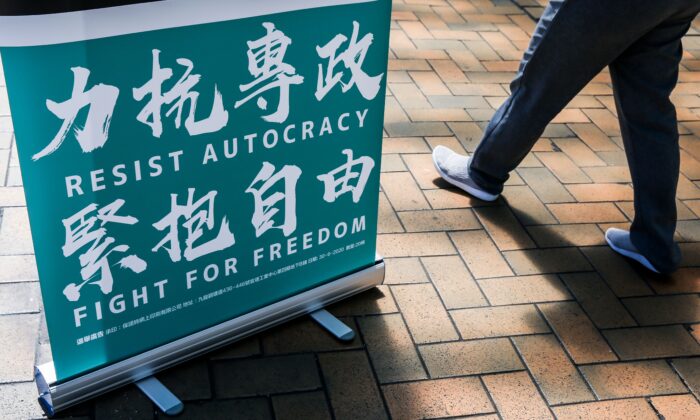US Sanctions 2 More Chinese Officials, Paramilitary Group for Human Rights Abuses in Xinjiang
Governments and officials around the world have condemned the Hong Kong government’s decision to delay an upcoming election, saying it was Beijing’s latest affront on the city’s freedoms.
“The world has watched the Chinese Communist Party’s continued, escalating assault on Hong Kong’s freedoms and autonomy,” Sen. Marco Rubio (R-Fla.) told The Epoch Times in a July 31 email.
On Friday, Hong Kong’s top official Chief Executive Carrie Lam announced the decision to postpone the September Legislative Council election by one year, citing a surge in local virus cases. Hong Kong has recorded triple-digit increases in COVID-19 cases for the tenth day straight, with 121 new cases recorded on Friday.
Rubio said Beijing was exploiting the virus pandemic to “remake Hong Kong in its image” and that “Hongkongers’ political freedoms are being crushed daily.”
White House press secretary Kayleigh McEnany, at a Friday press conference, condemned the election postponement, saying the action “undermines the democratic processes and freedoms that have underpinned Hong Kong’s prosperity,” and is “only the most recent in a growing list of broken promises by Beijing.”
The move dealt a blow to the local pro-democracy camp, which hoped to win a majority of seats in the legislature. In mid-July, more than half a million Hongkongers came out to cast ballots in an unofficial primary organized by pro-democracy activists, a turnout widely viewed as a symbolic protest against the national security law.
 A woman (centre L) uses her phone while waiting to vote during primary elections in Hong Kong on July 12, 2020. (Isaac Lawrence/AFP via Getty Images)
A woman (centre L) uses her phone while waiting to vote during primary elections in Hong Kong on July 12, 2020. (Isaac Lawrence/AFP via Getty Images)In reaction to the election postponement, Germany suspended its extradition treaty with Hong Kong. The United States, U.K., Australia, Canada, and New Zealand previously ended their agreements with Hong Kong following Beijing’s imposition of a sweeping national security law.
The law went into effect on July 1, the 23rd anniversary of Hong Kong’s transfer of sovereignty from British to Chinese rule.
On Thursday, local authorities mass-disqualified a dozen prominent pro-democracy activists from running in the election. Chris Patten, the last British governor, described the move as “an outrageous political purge.” And on July 29, the Hong Kong police’s new national security department made its first arrests, detaining four student activists for posting “problematic messages” advocating for independence on social media.
The recent developments in Hong Kong “represent a further infringement of the rights of Hong Kong citizens,” the Germany foreign ministry said in a statement on Twitter.
Hours after Lam made the announcement, Hong Kong police issued arrest warrants for six democracy activists currently based overseas, including Nathan Law and former British consular worker Simon Cheng, accusing them of violating the national security law.
Law, currently in the U.K., said that he had expected such a day to come when he fled Hong Kong amid growing Chinese encroachment, but that “this becoming a reality still disappoints, incapacitates, and frightens me.”
 Pro-democracy activist Nathan Law, along with Agnes Chow and Joshua Wong, attends a press conference in Hong Kong on Jan. 27, 2018. (Kin Cheung/AP Photo)
Pro-democracy activist Nathan Law, along with Agnes Chow and Joshua Wong, attends a press conference in Hong Kong on Jan. 27, 2018. (Kin Cheung/AP Photo)“[W]ho can enjoy freedom from fear in the face of China’s powerful political machine?” he said on Twitter. He said he has stopped contacting family members since leaving the city and will also sever ties with them.
“The arrests, the disqualifications, the wanted bulletins—these are indications of our need to remain active on the global stage,” he continued. “That Hong Kong has no place for even such moderate views like ours underscores the absurdity of Chinese Communist rule.”
The Hong Kong government’s decision also invited a torrent of U.S. criticism on Twitter. Rep. Vicente Gonzalez (D-Texas) called it a “slippery slope to authoritarianism,” while Sen. Rick Scott (R-Fla.) said it showed the Chinese regime’s pattern of suppression.
“Whether the election is tomorrow or in a year, [Hong Kong’s] desire for democracy won’t fade,” he wrote.
Focus News: Beijing Trying to ‘Remake Hong Kong in Its Image’ With City Election Delay: Rubio
DOJ Takes Action Against Researchers in Connection With Their China Work
